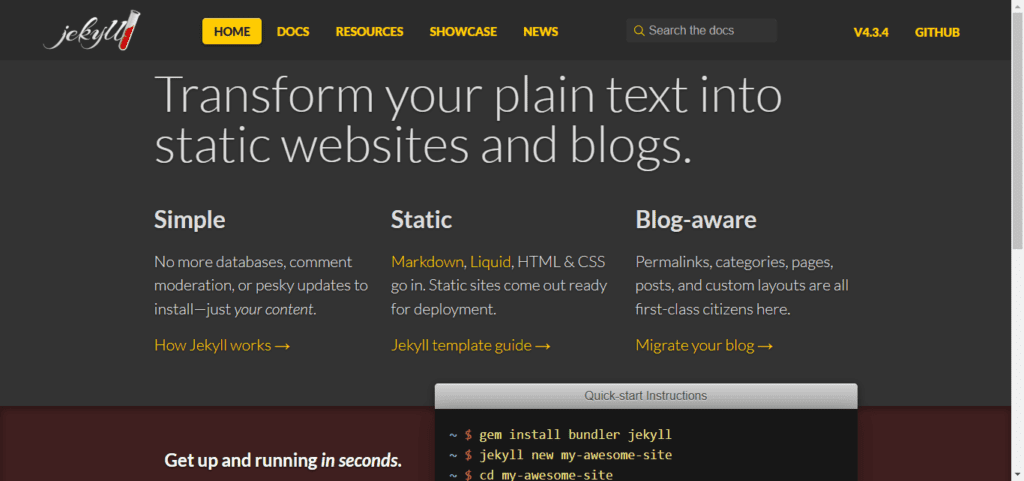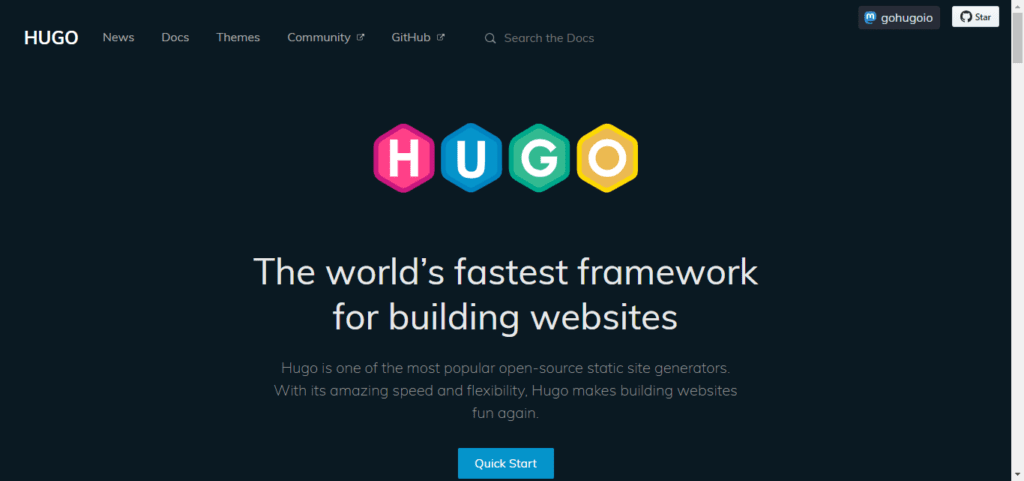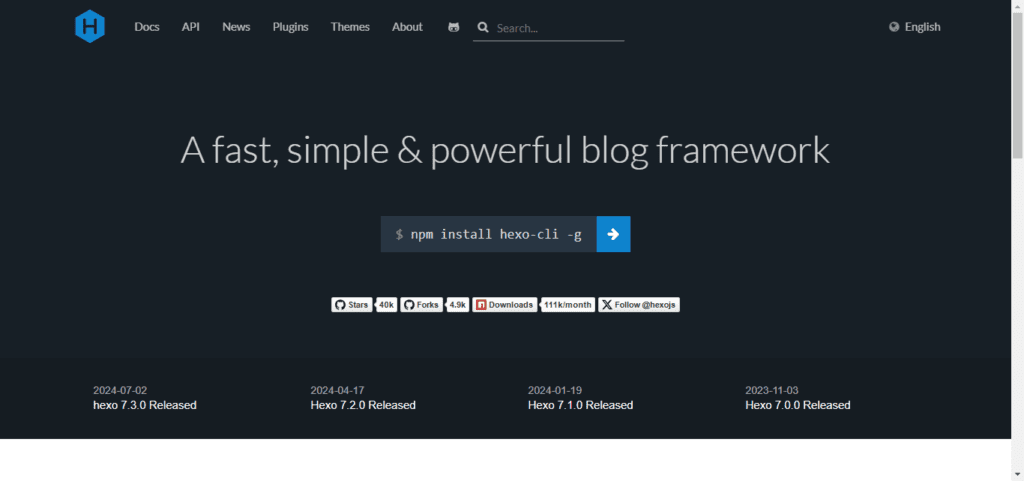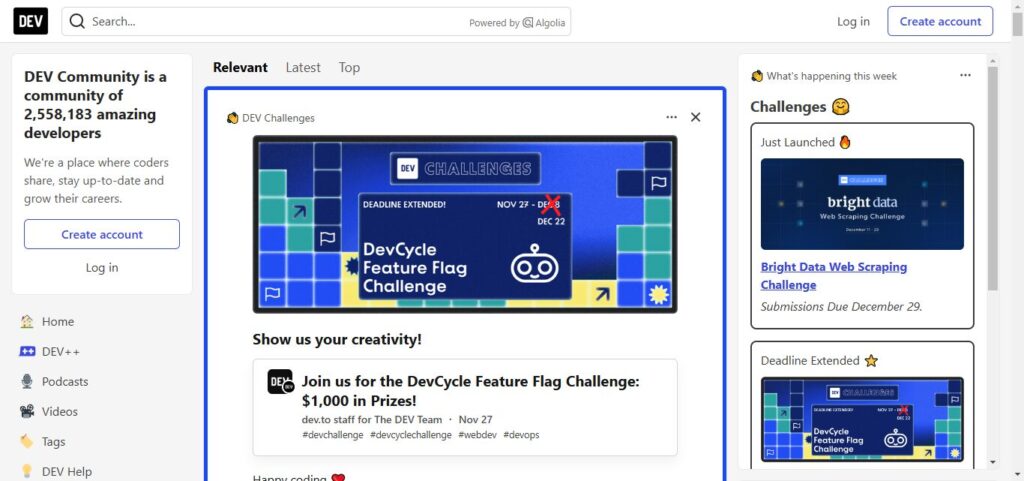What we’ve covered in this post
- What is the best blogging platform for developers
- Features to consider when choosing
- 8 best blogging platforms for developers/programmers
What is the best blogging platform for developers?
The best blogging platform for developers is one that offers you high customization options for designing visually appealing layouts, strong multi-device optimization for simple display, robust SEO tools for ranking in search engines, fast site speed for better user experience, and many more.
In general, a blogging platform is a (CMS) Content Management System where you manage your blog site (website) and customize your blog pages and posts the way you want.
It doesn’t require coding since you can use a pre-built site template that you can easily customize.
Basically, a blogging platform should allow you to:
- Write and publish blog posts: A user-friendly interface lets you write your content, format it with headings, images, and multimedia, and schedule your posts for publication.
- Manage your blog’s design: Blogging platforms offer a variety of themes or templates to choose from, allowing you to customize the look and feel of your blog without needing coding knowledge. Some platforms offer more design flexibility than others.
- Organize your content: You can categorize your blog posts, add tags, and create archives to help readers find your content easily.
- Engage with your audience: Most platforms allow readers to leave comments on your posts, fostering interaction and building a community around your blog.
Features to consider
As a developer or a programmer here are features to expect when choosing the best blogging platform for a technical niche like this.
- Customizability and Flexibility – The platform should allow you to fully customize your blog with access to the code, enabling you to write custom HTML, CSS, JavaScript, or even backend code if needed.
- Support for Development Tools – Look for integration with development tools, version control (e.g., GitHub), and CI/CD pipelines to streamline your workflow.
- Support for Markdown – As a developer, you may prefer writing in Markdown instead of using WYSIWYG editors. Platforms supporting Markdown make it easier to format content.
- Scalability – The platform should be able to handle large traffic, advanced features, and the flexibility to scale as your audience or project grows.
- SEO and Performance Optimization – Ensure the platform allows you to optimize your blog for performance (loading speeds, caching) and SEO (meta tags, URL structures).
- Extensibility and Plugins – Check if the platform offers plugins or add-ons that can extend functionality, such as syntax highlighting for code snippets, API integrations, or developer-friendly analytics.
- Security – Security is crucial, especially when dealing with code. Make sure the platform is secure or allows you to implement your own security measures.
- Integration with APIs and Databases – A good platform should allow easy integration with APIs, databases, and frameworks for adding dynamic content, custom apps, or tools to your blog.
- Command Line Interface (CLI) – A CLI for interacting with the platform will help you automate tasks, deploy updates, and make changes without leaving your terminal.
8 Best Blogging Platforms For Developers/Programmers
- WordPress.org
- Jekyll
- Hugo
- Ghost
- Hexo.io
- Hashnode
- Dev.to
- GitHub Pages
[1]. WordPress.org [Free]

WordPress.org is Highly customizable with tons of themes and plugins, including those tailored for technical blogs.
You can integrate code-highlighting plugins to make your posts more developer-friendly. WordPress is the most used blogging platform with over 480 million users worldwide.
Features of WordPress.org for developer
- Cost: Free and requires web hosting
- Customizability and Flexibility: Extremely customizable with access to full codebase.
- Support for Development Tools: Works with various development environments.
- Support for Markdown: You can use Markdown plugins.
- Scalability: Scales with the right hosting infrastructure.
- SEO and Performance Optimization: Extensive SEO plugins and performance optimizations.
- Extensibility and Plugins: Thousands of plugins are available.
- Security: Secure with proper configurations and plugins.
- Integration with APIs and Databases: Highly extensible with API and database integrations.
- CLI: WP-CLI for managing WordPress from the command line.
How To Start A Blog Using WordPress.org
- Step 1: Click on “HostGator” to get started
- Step 2: Choose your preferred HostGator plan
- Step 3: Choose your preferred domain & complete your sign-up
- Step 4: Within your HostGator account “Install WordPress” your blogging platform
- Step 5: Within WordPress choose your blog theme [A Pre-built Site]
- Step 6: Remove, add, or customize the pre-designed pages and you can also create and customize as many as possible blog posts as you want.
Examples of tech blogs built with WordPress.org
[2]. Jekyll

Jekyll, like Hugo, is a static site generator, often used with GitHub Pages. It’s great for developers who want a lightweight blogging platform they can customize fully.
Features of Jekyll to developers
- Cost: Free and requires web hosting
- Customizability and Flexibility: Highly customizable, static site generator.
- Support for Development Tools: GitHub integration and easy use with version control systems.
- Support for Markdown: Markdown-based content creation.
- Scalability: Scales effortlessly with GitHub Pages or other static site hosts.
- SEO and Performance Optimization: Fast, static websites are naturally optimized for SEO.
- Extensibility and Plugins: Supports plugins for added functionality.
- Security: Static sites are secure, with minimal attack surfaces.
- Integration with APIs and Databases: Can be integrated with APIs through JavaScript.
- CLI: CLI is used to generate and manage posts.
[3]. Hugo

Hugo is a static site generator that allows developers to create fast, secure blogs with full control over customization.
It’s ideal for those comfortable with technical configurations.
Features of Hugo for developers
- Cost: Free but requires web hosting
- Customizability and Flexibility: Super fast static site generator with robust customization.
- Support for Development Tools: It can be integrated with CI/CD tools.
- Support for Markdown: Markdown support for easy content writing.
- Scalability: Highly scalable for large blogs.
- SEO and Performance Optimization: Generates very fast-loading sites.
- Extensibility and Plugins: Customizable with various themes and plugins.
- Security: Static site, secure by nature.
- Integration with APIs and Databases: Can integrate with external APIs.
- CLI: Uses CLI for building and managing sites.
[4]. Ghost

Ghost is a minimalist, fast platform with Markdown support, ideal for technical writing.
It offers built-in SEO features and is great for developers who want a clean, simple interface.
Features of Ghost for developers
- Cost: $9/month
- Customizability and Flexibility: Customizable, designed for developers who want control over their site.
- Support for Development Tools: Great API and open-source, allows integration with tools.
- Support for Markdown: Native Markdown support.
- Scalability: Scalable with Ghost’s managed hosting or self-hosting.
- SEO and Performance Optimization: Built-in SEO and fast performance.
- Extensibility and Plugins: Supports integrations via API and plugins.
- Security: Strong security features.
- Integration with APIs and Databases: Well-documented API for integration.
- CLI: Ghost CLI for installation and updates.
[5]. Hexo.io

Hexo.io is a free and open-source blogging framework that allows you to create static websites.
Here are the key points about Hexo:
- Helps you create blog posts and pages using Markdown, a simple and readable text formatting language.
- Generates static HTML files for your blog, which are faster loading and more secure than traditional server-side generated content.
- Offers a wide range of themes and plugins for customization and adding functionalities to your blog.
Features of Hexo.io to its users
- Cost: Requires a web hosting
- Customizability and Flexibility: Flexible, static site generator built for speed.
- Support for Development Tools: Integrates well with version control and CI/CD.
- Support for Markdown: Markdown support.
- Scalability: Static generation makes it scalable.
- SEO and Performance Optimization: Fast, static pages help with SEO.
- Extensibility and Plugins: Plugins for extra features.
- Security: Secure due to static nature.
- Integration with APIs and Databases: JavaScript-driven for API integrations.
- CLI: Uses CLI for easy deployment.
[6]. Hashnode

Specifically designed for developers. Hashnode allows easy integration of code snippets, Markdown support, and custom domains for free. It has a built-in developer community, so your content can reach a targeted audience.
Features of Hashnode
- Cost: Requires a domain
- Customizability and Flexibility: Offers some flexibility with themes but is less customizable compared to self-hosted options like WordPress.
- Support for Development Tools: Supports Markdown and has an API for integration with other developer tools.
- Support for Markdown: Fully supports Markdown for writing.
- Scalability: Hosted on Hashnode, so scaling is managed by the platform.
- SEO and Performance Optimization: Built-in SEO features to help your posts rank on search engines.
- Extensibility and Plugins: Limited, but supports integrations with GitHub for auto-publishing blogs from your repository.
- Security: Hosted securely by Hashnode, so minimal management is required.
- Integration with APIs and Databases: API available for integrations.
- CLI: No CLI, but it has integration with GitHub for a seamless workflow
[7]. Dev.to

A popular platform where developers share their knowledge.
It’s community-driven with simple posting features, including Markdown support.
Dev.to is great for building a developer-focused blog with minimal setup.
Features of Dev.to
- Cost: It’s free and allows you to share content among other developers within the platform
- Customizability and Flexibility: Less customizable since it’s hosted on Dev.to, but allows for a personal domain.
- Support for Development Tools: GitHub integration and Markdown support.
- Support for Markdown: Fully supports Markdown.
- Scalability: Dev.to handles scalability, so it’s not a concern for users.
- SEO and Performance Optimization: Optimized for SEO; posts rank well due to the platform’s domain authority.
- Extensibility and Plugins: Limited customization and plugins as it’s more of a social coding platform.
- Security: Fully managed, so security is handled by the platform.
- Integration with APIs and Databases: Supports integrations with APIs via custom code.
- CLI: No CLI, but GitHub integration allows seamless updates.
[8]. GitHub Pages

GitHub Pages allows developers to host their blogs directly from their GitHub repositories.
It’s flexible and integrates perfectly with GitHub, ideal for technical blogs and portfolio sites.
Features Of GitHub Pages
- Cost: Its free, GitHub Pages allows you to host static websites directly from your GitHub repository.
- Customizability and Flexibility: Fully customizable since you can directly edit the code; supports Jekyll for static site generation.
- Support for Development Tools: Full control with Git integration, making it ideal for developers.
- Support for Markdown: Supports Markdown natively.
- Scalability: Scalable is a static site, with limits depending on GitHub’s hosting capabilities.
- SEO and Performance Optimization: Fast performance as it’s a static site, with the potential for strong SEO if optimized.
- Extensibility and Plugins: Can be extended with Jekyll plugins.
- Security: Secure hosting with GitHub’s infrastructure, though you need to handle security best practices.
- Integration with APIs and Databases: Can integrate with APIs through JavaScript, but no native database support.
- CLI: Fully Git-based, so CLI is used for version control, deployment, and updates.





